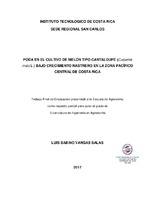Poda en el cultivo de melón tipo cantaloupe (cucumis melo l.) bajo crecimiento rastrero en la zona pacífico central de Costa Rica
Abstract
This study evaluated the effect of the application of pruning on the development, precocity, production and quality of cantaloupe melon under creeping growth during rainy season. The research was carried out in the Agricola Mayan farm in the district of Ceiba, located in the canton of Orotina in the province of Alajuela, which is located at an altitude of approximately 163 meters above sea level during the months of July, August, September and October Of 2016. A cantaloupe melon of the Hy Mark variety was used and a Completely Randomized experimental design with a factorial arrangement of 3 x 2 composed of Factor A (stem pruning), Factor B (fruit pruning) and the interaction between both; six treatments were performed with seven replicates of ten plants each. In the vegetative development phase were found significant differences in the number of leaves, however the leaf area did not show differences between treatments. During reproductive development, significant differences were obtained in favor of treatments with pruning regarding the number of female flowers and number of fruits per square meter. With regard to precocity, significant differences were found in the days at female flowering, days at fruiting and days at harvest completion. In production, it was determined that the treatments with pruning performed statistically the same as the treatments without pruning, although treatment pruned on the main stem and on secondary stems presented a yield of 3 tons / ha more than the control treatment. There were no significant differences in sugar content and pulp thickness.
Description
Tesis (Licenciatura en Ingeniería en Agronomía). Instituto Tecnológico de Costa Rica, Escuela de Agronomía, 2017.


